The Reel Blues Fest
at Cape Cod Melody Tent, 2003
|

|
The Cape Cod Melody Tent
Sunday, August 31, 2003 4:30 PM - 10:30 PM
The Films
a film by Scott Taradash
an excerpt from the seven part series executive
produced by Martin Scorsese
Welcome to the 3rd
The Reel Blues Fest
Where Independent Film Meets Independent Music
The Reel Blues Fest is an annual summer
event co-presented by the New England Blues Society
and the Woods Hole Film Festival, both non-profit
organizations, dedicated to helping independent musicians
and filmmakers.
The Reel Blues Fest is a celebration
of Blues, the quintessential American music,in both
its rich traditional form and its evolution into the
21st century. Musicians and filmmakers
who make blues their passion are often driven by the
compelling connection of blues with all people. Recognizing
this universal truth of blues music,Congress has proclaimed
2003 to be The Year of the Blues. For all those performing
today, however, every year is the year of the blues
The Reel Blues Fest grew out of the acknowledgment
that in spite of the amazing power of the music, many
independent musicians and filmmakers still struggle
torealize such basics as access to medical care or
even the ability to get their workmade or seen. As
The Reel Blues Fest grows and develops, we will remain
dedicated toward achieving our goal, which is to help
musicians and filmmakers obtain some of these basics.
Both the New England Blues Society and the WoodsHole
Film Festival have programs already in place that
are fulfilling some of theseneeds but both organizations
need to maintain and expand these programs. Yoursupport
in this effort is crucial and we thank you for being
here at this incredible event.
Today, we have an impressive line-up
of music and film, as well as the presentationof lifetime
achievement awards, and the Mai Kramer award for excellence
in Blues Radio - all dedicated to that marvelous music
called Blues.
We hope that as you enjoy this wonderful
day, you will take the time to come talkto us and
find out how to get involved. We would also like to
thank our sponsorsfor their continuing and unfailing
support: The Boston Phoenix & WFNX; everyone at
92.7 WMVY, and especially Barbara Dacey and Greg Orcutt;
WGBH, Boston, presenting The Blues™,
a seven part series executive produced by filmmakerMartin
Scorsese beginning September 28, 2003, and especially
Chikka Offurum;
90.1 WCAI and 91.1 WNAN, and especially
Susan Loucks; AV Presentations for the ability to
screen films here today; Northeast Performer Magazine,
and everyoneat the Cape Cod Melody Tent. Also a special
thanks to Tim Miller, Holly Harris,Steve Sweeney,
John Black, Dan Gewertz, Peter Black,Carter Alan and
Imus.
To find out more about the programs of
the New England Blues Society, check on- line at www.nebs.org.
To find out more about the programs of
the Woods Hole Film Festival, check on line at www.woodsholefilmfestival.org
or call (508) 495-3456.
To find out more information about sponsoring
our events or donating to The Reel Blues Fest, email
us at info@woodsholefilmfestival.org.
On behalf of The Reel Blues Fest, we thank you.
James Montgomery, Judy Laster, Dana
Wolfe, Barry Miller. Jean-Paul Ouellette, Fran Berger,
Jim Carty, Peter Cahill, Shirley Lewis, Eugene Ezchor,
Peter Hackel & Sean Hunter.
The Reel Blues Fest 2003 is dedicated
to Warren Zevon.
|
THE MUSIC
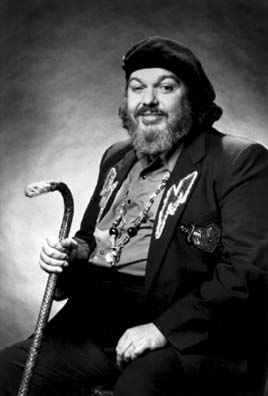 DR.
JOHN DR.
JOHN
Malcolm John Rebennack, Jr. was born on November
20, 1941. His mother, Dorothy, and his father, John Rebennack,
Sr. owned a radio and electronics shop. By the time he was
three Mac was already playing around on the family piano.
When Mac reached his teens his mother took him downtown
to Werleins's Music where he picked out a guitar.
His father's friend Cosimo Matassa owned
the only recording studio in town. Rock & roll music
was in full swing. Mac left school during his junior year,
formed a band the Dominos, took session work at Matassa's
studio for such legends such as Professor Longhair and James
Booker, and finished high school via correspondence course.
In 1958, Mac, now 17,joined the musicians'
union and started writing songs with his friend, Seth David.
They placed a few with Specialty Records through Harold
Battiste. Between 1956 and 1963 more than fifty of Mac's
compositions were recorded in New Orleans.
An altercation in 1961 which Mac tried to break
up resulted in his left index finger being damaged. It took
a year to heal, and he was never again able to play guitar
as he had before. Mac began to play piano again and learned
to play organ with the help of James Booker. That was the
year New Orleans night clubs were rocked by the election
of Earling Carothers "Jim" Garrison as District
Attorney. Garrison put the screws to club owners, cracking
down on gambling and prostitution. Clubs began to close
down. Like many of his friends, Rebennack left for Los Angeles
where exiled New Orleans studio musicians were in demand.
Mac's old buddy Harold Battiste was working
as a producer for Sonny and Cher, and he hired Mac to play
with the duo on the road as well as getting him session
work. Rebennack worked with L.A. producers Leon Russell
and Phil Spector, playing keyboards and/or guitar, often
uncredited, on recordings by Iron Butterfly, Buffalo Springfield,
John Sebastian, and other rock, psych, soul, blues and pop
acts.
In 1967, he thought up the concept of forming
a musical group around thepersonality of Dr. John, a 19th
century New Orleans root doctor and, through
Harold Battiste, managed to cut a few tunes on
"free" studio time at the Gold Star Studios.
Ahmet Ertegun, despite the album being recorded "on
the sly," agreed torelease it on Atco. The album,
Gris-Gris, fell right into the "hippie" groove
of thetime and soon became a kind of underground hit, being
supported by the freeform radio stations and receiving good
reviews.
Three more psycho-voodoo albums followed: Babylon
sold poorly. Remedies went deeper into New Orleans musical
styles but suffered from beingunderproduced. The rock community
rallied around him for The Sun, the Moonand Herbs as Mick
Jagger, Eric Clapton, and others assisted in the sessions.Unfortunately,
it was not a commercial success. Mac Rebennack and his singersworked
backing the Rolling Stones on Exile On Main Street and with
The Band.
With Jerry Wexler from Atlantic Records, Dr.
John moved in a moretraditional direction. Gumbo charted
in Billboard and included renditions of "Tipitina",
Earl King's "Those Lonely Nights", "Iko
Iko." Mac dropped the Dr.John hoodoo persona and embarked
on a major tour of Europe and the UnitedStates, his career
at an all-time high. 1973's In The Right Place spawned
the topten hit "Right Place, Wrong Time". Mac
toured with the Meters and ProfessorLonghair, playing sold
out shows in London and Paris and appearing at theMontreux
Jazz Festival. The following year Dr. John, Toussaint, and
The Metersrecorded the followup album, Desitively Bonaroo.
Between 1974 and 1978, Mac worked on tracks by
Aretha Franklin("Spanish Harlem") and Carly
Simon & James Taylor ("Mockingbird"). He
produced Van Morrison's A Period of Transition album
as well as Levon Helm's RCO All-Stars. He appeared
at the Band's farewell concert, The Last Waltz. Herecorded
the incredible LP City Lights for Horizon Records in 1978.
In the 1980s he recorded back-to-back solo piano
albums: Dr. John PlaysMac Rebennack and The Brightest Smile
In Town. These are extremely importantdocuments of Rebennack's
oft-ignored piano chops. The recordings that followed saw
Rebennack heading farther into a jazz groove. In a Sentimental
Moodfeatured Cole Porter and Duke Ellington numbers (and
a wonderful duet withRicky Lee Jones), and Bluesiana Triangle/Blusiana
Triangle II saw him workingwith jazz greats Art Blakey and
Fathead Newman.
1992's Goin' Back to New Orleans
is Dr. John's history of New Orleansmusic, from Buddy
Bolden and Jelly Roll Morton, the Mardi Gras Indians, rightup
to the funky music of Allan Toussaint and the Meters, not
to mention Dr. Johnhimself. The album was a critical and
commercial success. Since then he has recorded prolifically,
recording the albums Television, Afterglow, Trippin'
Live, Crawfish Soiree, Anutha Zone, Duke Elegant and Creole
Moon.
As Dr. John himself says: "No matter how
far away from New OrleansI've gone and what I've
done, sooner or later I always want to come back to myhometown
for a roots recharge. LA and New York are cool, but neither
holds thespell for me that New Orleans still does…for
better or worse, New Orleansremains its own strange self,
and more than a little bit out of sync with other placesin
the United States. This is one of its charms, but it's
also a curse."
For further reading, check out "Under A
Hoodoo Moon, The Life Of The Night Tripper," his very
sincere memoirs published in 1994.

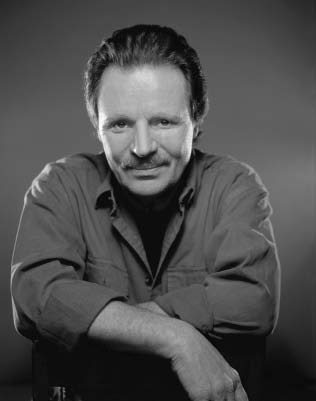 DELBERT
MCCLINTON DELBERT
MCCLINTON
McClinton's early
memories include being taken by his parents to see Bob Wills
& His Texas Playboys at The Cotton Club in Lubbock,
Texas, where he was born. His family moved to Ft. Worth
when McClinton was 11, a city known as a fertile incubator
for a variety of music styles. Out on the Jacksboro Highway
at clubs like Jack's Place, Delbert mastered the craft
of keeping the hard-drinking rednecks, cowpokes and roustabouts
entertained all night long. And at the legendary Skyliner
Ballroom, where McClinton's band, the Straitjackets,
was the only white act to play its
Blue Monday nights AND be the backing band for
the headliners, he
received a first-class tutelage from the masters of blues
music like Jimmy Reed, Howlin'Wolf and Sonny Boy Williamson.
McClinton made his first recordings as a member
of the Ron-Dels, and was noted for his distinctive harmonica
work on Bruce Channel 's "Hey Baby," a
Top 3 single in the UK and number 1 in the USA in 1962.
On a subsequent package tour of England, Delbert showed
some of his harp licks to the rhythm guitarist for a young
band at the bottom of the bill. Legend has it the young
musician was John Lennon and that harmonica lesson resulted
in the sound heard on "Love Me Do."
In the early 1970s, McClinton and his Ft. Worth
pal Glen Clark headed out to Los Angeles. They achieved
a degree of artistic success, releasing two then obscure
but now prized albums for Atlantic Records as Delbert &
Glen.
Returning to Texas, he landed a deal with ABC
Records. With the release of his 1975 solo debut, Victim
of Life's Circumstances, McClinton firmly stamped
his Ft. Worth-bred blend of blues, country and blue-eyed
soul onto the pop musical landscape. A succession of influential
and critically acclaimed albums followed, along with coups
like appearing on "Saturday Night Live" in its
heyday -an acknowledgment of the pages torn from Delbert's
play book by Dan 7 Aykroyd and John Belushi when
they formed The Blues Brothers. He scored hits like "Giving
It Up For Your Love" and "Sandy Beaches,"
won a Grammy with Bonnie Raitt for their "Good Man/Good
Woman" duet, and over the years has enjoyed covers
of his songs by Emmylou Harris, The Blues Brothers, Vince
Gill, Wynonna, Lee Roy Parnell, Martina McBride, Garth Brooks
and Trisha Yearwood, among others.
His subsequent output reflects several roadhouse influences.
Three gritty releases, Victim Of Life's Circumstances,
Genuine Cowhide and Love Rustler, offered country, R&B
and southern-style funk, while a 1979 release, Keeper Of
The Flame, contained material written by Chuck Berry and
Don Covay, as well as several original songs, including
loving remakes of two compositions from the Delbert And
Glen period. Emmylou Harris had a C&W number 1 with
McClinton's "Two More Bottles Of Wine"
in 1978, and "B Movie Boxcar Blues" was used
in the John Belushi/Dan Aykroyd movie The Blues Brothers.
His 1980 album, The Jealous Kind , contained his solitary
hit single, a Jerry Williams song, "Givin' It
Up For Your Love', which reached the US Top 10.
After a rest-period during much of the 80s, this rootsy
and largely underrated figure made a welcome return in 1989
with the fiery Live From Austin.
His work during the 90s showed no signs of a drop in quality,
with 1997's assured One Of The Fortunate Few arguably
his finest recording to date. Tightening radio formats may
have offered fewer opportunities for his expansive musical
approach, yet McClinton solidified his loyal following with
his relentless touring and his annual Delbert McClinton
& Friends Sandy Beaches Cruise every January in the
Caribbean. Now free from major label pressure, it is to
be hoped that McClinton's best work is yet to come.

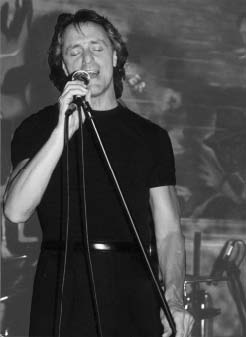 JAMES
MONTGOMERY JAMES
MONTGOMERY
Originally from Detroit, blues harmonica master
James Montgomery has led his own band, the James Montgomery
Blues Band, since 1970. James started the group in Boston
while he was attending Boston University.
While growing up in Detroit, James learned the
blues first hand from James Cotton, Jr.Wells and John Lee
Hooker. He has since played with blues legends such as B.B.
King, Bonnie Raitt and Buddy Guy as well as rock greats
like Bruce Springsteen, Mick Jagger and Aerosmith. In recent
years, James has also recorded with fellow Motor City musician
Kid Rock, for the hip-hop/rocker's DJ Uncle Kracker's
year 2000 release.
Among other artists he's played or recorded with include
Gregg Allman, Les Paul, Bo Diddley and Steve Miller. He
was also a member of the Original Blues Brothers on a Texas
tour.
Montgomery's band has been a showcase for
many now famous alumnae prompting Peter Wolf to refer to
Montgomery as the John Mayall of New England.
For the past two years Montgomery has been a
featured member of the Johnny Winter Band, touring the world
extensively and recording. Montgomery co-wrote a song with
Johnny that will appear on the next Johnny Winter release.
James Montgomery shows his commitment to the
blues in many ways. He is vice president of The New England
Blues Society, an organization that works toward furthering
blues education in New England as well as establishing health
benefits for blues musicians. He was presented with the
first ever "Statesman of the Blues" from his
peers to honor his tireless efforts to promote the blues.
He is also co-founder of ACRC (Aids Camp Relief Coalition),
which is dedicated to sending children with HIV to camp.
Montgomery also spread the blues gospel through
his syndicated radio show called "Backstage With the
Blues." The artists he's interviewed, such as Bonnie
Raitt, Dr. John and John Lee Hooker, tell the stories behind
their music. Who better to reminisce with than a man who
has been living and breathing the blues for the last thirty
years? None other than James Montgomery.

James
Montgomery and Friends
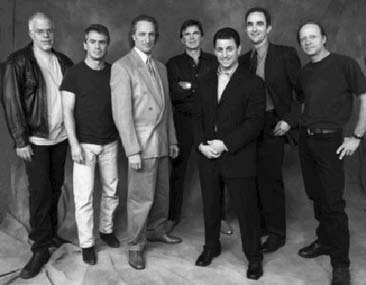 Officially
formed in 2000, James Montgomery and Friends, draw
from decades of personal and professional experience.
'The Friends' share a unique musical history and
understand the gift of performing together to support
worthy causes. Officially
formed in 2000, James Montgomery and Friends, draw
from decades of personal and professional experience.
'The Friends' share a unique musical history and
understand the gift of performing together to support
worthy causes.
Many of the Friends are known from recent and previous
works . . . Johnny A, Stu Kimball (Peter
Wolf), Joe Pet (Joe Perry Project), Dan Kenny
(MD/ Brittany Spears Band), Steven Paul Perry
(John Hiatt, Orchestra Luna), John Ryder (Face
to Face), John Troy (Pousette-Dart Band), Dan
Rabinovitz (Solomon Burke), Bruce Marshall
(Toy Caldwell), Harry T, Dave Freedman (The
Stompers), Mark Naftalin (Paul Butterfield) Dom
Dinardo (Tower of Power) and Peter Hackel (JM+F
co-founder) make up a few of the core group of musicians
that have become The Friends.
Although he continues to record and tour with the ever-popular
James Montgomery Band, as well as being front man for
the legendary Johnny Winter Group, Mr. Montgomery has
found another home with The Friends. "These guys
came along at a good time for me and over the years it
has continued to gel on every level" comments Mr.
Montgomery. "Our personal history and musical background
is the glue which holds us together on and off stage".
The love of the music and the opportunity to give back
to the community and less fortunate is paramount with
the group as they find fundraising events the best stage
for what they do. "Over time, we have learned what
is really important in our lives and our music, so we've
committed our time and energy as a group to charitable
causes " says drummer and co-founder Peter Hackel.
"I take per-10 sonal pride and find great
pleasure working with these guys," adds John Ryder.
"Being in a position to help others while having
so much fun is a blessing".
Select James Montgomery and Friends Fundraising Performances
October 2, 2001: Scullers Jazz Club, Cambridge MA:
First Annual 9/11 event. January 2002: Waterville Valley
Ski Area: Multiple show weekend at to benefit the Adaptive
Skiing Program. April 2002: International Place, Boston:
Great Chef's Event to benefit Dana Farber Cancer Institute.
May 2002: Park Plaza Hotel / Grand Ballroom w/Steven Tyler:
To benefit Victory Programs. September 12th
2002: The Big Easy, Boston: Second Annual 9/11 event to
benefit Victory Programs. February 27, 2003:Regent Theatre,
Arlington, MA w/Steven Tyler: To benefit Middlesex Human
Services Agency. April 24, 2003: Sheraton Braintree: To
benefit The Leukemia Society of Massachusetts. May 17,
2003: Boston's Museum of Science: To benefit Granada House.
August 31, 2003: Cape Cod Melody Tent: To benefit New
England Blues Society / Woods Hole Film Society. September
11, 2003: The Roxy, Boston: Third Annual 9/11 event to
benefit Boston City Hospitals, Child Witness to Violence
Project.

SPECIAL GUESTS
Jon
Butcher, Vocals, Guitar
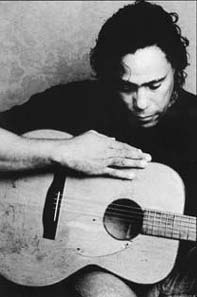 As
the founder of Jon Butcher Axis, Jon Butcher was one of
a select handful of influential recording artists on the
now legendary Boston music scene during the eighties and
nineties. The MTV video "Life Takes A Life"
and subsequent Grammy nomination were the beginnings of
a recording/touring career that continues to this day.
With a discography of 15 national and international releases,
international critical acclaim, awards and the support
of fans worldwide, Jon Butcher in 1999 launched Electric
Factory, a state-of-the-art recording facility with emphasis
on film, TV and multimedia. As
the founder of Jon Butcher Axis, Jon Butcher was one of
a select handful of influential recording artists on the
now legendary Boston music scene during the eighties and
nineties. The MTV video "Life Takes A Life"
and subsequent Grammy nomination were the beginnings of
a recording/touring career that continues to this day.
With a discography of 15 national and international releases,
international critical acclaim, awards and the support
of fans worldwide, Jon Butcher in 1999 launched Electric
Factory, a state-of-the-art recording facility with emphasis
on film, TV and multimedia.
Jon's love of the American music form is boundless,
from Jazz and Blues to Dixieland and
Appalachia. "Our motto here is real music made by
real people. We specialize in organic, home grown and
somewhat eclectic approaches. I've compiled a who's
who call list of players over the years that really makes
the music breathe."
1999 and 2000 have seen Jon Butcher and Electric
Factory on television (Turks, Pensacola-Wings Of Gold,
CBS Television), in film (The War At Home -Tri-Star, Bedroom
Window - Tri-Star) and on the airwaves (Best Of...; EMI/Capitol)
with a live concert CD (King Biscuit Flower Hour) on store
shelves now. Music has probably changed forever with the
recent explosion of the internet. Personally, I embrace
the changes and all the potential access those changes
offer. Composers now have a way of seeking, and being
sought out like never before. For someone doing something
different, that's a good thing."
John Ryder, Bass
Raised in and around Boston, John Ryder entered
the late 1970's punk scene playing bass for the avant-garde
progressive power trio Ann Prim Group (pre November Group).
From there John followed Powerhouse's frontman George
Leh into hard traveling blues group George Leh and the
Thrillers. The band ran from 1978-1980 and opened for
tons of compatible shows like James Cotton, Albert King
and James Montgomery. From 1980 to 1988 John was a member
of the legendary rock band Face to Face, remembered for
their 1984 Top 40 hit "10-9-8." Besides Ryder
on bass, Face to Face was Laurie Sargent (vocals), Stu
Kimball (vocals, guitar), Angelo (guitar), Billie Beard
(drums, percussion). Their Los Angeles experience included
an acting appearance as the Attackers in the 1984 film
"Streets of Fire," with the guys acting and
Laurie lending her voice for Diane Lane's character. The
band also toured with Cyndi Lauper, The Romantics, and
The Alarm and opened for everyone else in venues from
Boston to New York City. When that wound down, John ventured
into a normal life in electronics manufacturing while
still using his musical talents for contemporary Christian
rock, first at Park Street Church, now at Chapel of the
Cross in Southborough. When "normal life"
changed on September 11th, James Montgomery, Peter Hackel
and Ryder set out to create the Friends, and he's been
enjoying performing for charity ever since.
Shirley
Lewis, Vocals
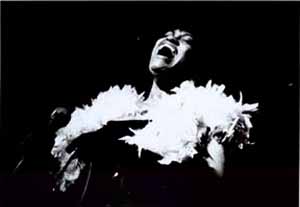 Shirley
Lewis was born in Sicklerville, New Jersey on February
25, 1937. She performed professionally since early childhood
with her father and brothers as the Lewis Gospel Singers.
She sang throughout her youth and after high school became
an accountant, singing in church on the weekends. The
music won out over the numbers and she traveled to Las
Vegas, San Francisco and ended up in Vancouver British
Columbia in 1972. She sang in a show at Isy's Supperclub
in a revue called, "Black is Beautiful." She
then held a residency at club New Delhi for a four year
run. Shirley continued her mutual love affair with Canada,
touring throughout the country until 1985. Shirley
Lewis was born in Sicklerville, New Jersey on February
25, 1937. She performed professionally since early childhood
with her father and brothers as the Lewis Gospel Singers.
She sang throughout her youth and after high school became
an accountant, singing in church on the weekends. The
music won out over the numbers and she traveled to Las
Vegas, San Francisco and ended up in Vancouver British
Columbia in 1972. She sang in a show at Isy's Supperclub
in a revue called, "Black is Beautiful." She
then held a residency at club New Delhi for a four year
run. Shirley continued her mutual love affair with Canada,
touring throughout the country until 1985.
Lewis moved back to the states to be closer to
her family in the mid-80s, settling in the Boston area.
She has been a Boston based singer since that time, recording
and touring all along. Shirley Lewis is a gifted vocalist
who sings from the heart, like many of her fellow Jersey
and Philadelphia R&B singers. She is more concerned
with the feel of her performance than the technicality
of it. That's a tradition that goes back a long way. Some
of today's music students can take a lesson from that
approach. She is the recipient of the 2001 Blues Trust
Lifetime Achievement Award.
Jessie
Payo, Vocals
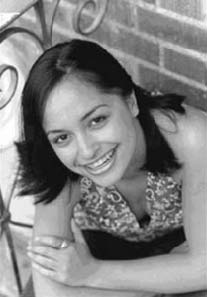 At
five foot, young Jesse Payo packs a powerful vocal punch.
She's already won "Emerging Artist of the Year"
award at the Las Vegas EAT'M event. She's been compared
to Janis Joplin, Aretha Franklin and Etta James, but what
comes across is pure Jessie. Born in Colorado and raised
in LA by performer parents, Jessie was in her first musical
at the age of 4. At
five foot, young Jesse Payo packs a powerful vocal punch.
She's already won "Emerging Artist of the Year"
award at the Las Vegas EAT'M event. She's been compared
to Janis Joplin, Aretha Franklin and Etta James, but what
comes across is pure Jessie. Born in Colorado and raised
in LA by performer parents, Jessie was in her first musical
at the age of 4.
At the age of 12 she was smitten by the blues
and her focus changed. She put herself on a healthy diet
of Etta James, Memphis Minnie, Big Mama Thornton, with
doses of Sarah Vaughn, Dinah Washington and Ella Fitzgerald.
By the time she was 14 in 1996, she had her own band,
Jessie and the Raindogs in Burbank, California.
Her band has performed at such venues as The
House of Blues, B.B. King's Blues Club, Gilley's at the
Frontier in Vegas, Cozy's, and many more. She writes her
material with her father Jose Payo of the band Blues Garage.
He is also the bass player, back up vocalist and arranger
for Jessie & The Raindogs which also includes Tom
Romero on guitar and Steve Kim on drums.
Jessie was inducted into "Women of the
Blues" when she was 16 and was nominated for an
L.A. Music Award in the Category of Best Female Vocalist.
The band was nominated for Best Blues Artist. Several
of their songs have reached #1 on the blues charts on
mp3 and Jessica perfomed at the first stop of the Women
of mp3 tour in San Diego in 2000. Their songs have been
featured on the radio stations KLOS in Los Angeles, KUCI,
Irvine, and KSFM San Mateo and has also been featured
on "The Young and the Restless."
An accomplished actress and dancer, Jesee is
also a member of the Los Angeles Women in Shakespeare
Company.
Through the internet, she has gained many fans
throughout the world: in England, Australia, France, Switzerland,
Germany, Japan, and Brazil. Her songs are played on over
40 radio stations on the internet. Her record release
concert at B.B. King's Blues Club was a sell-out; and
as the manager of B.B.'s noted, "We haven't had
a crowd like this since B.B. himself played here."
It's all about the blues.
Weepin Willie,
Vocals
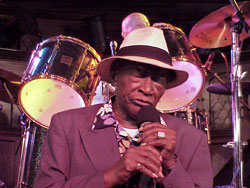 Born
in Atlanta on July 6, 1926, William Lorenzo Robinson is
known as Weep to hisclose friends. He grew up in Winter
Garden, Florida.. In 1939, when he was 13, hisfather put
him on a truck bound for a farm in New Jersey where they
needed someextra hands, and that was the last he saw of
him. His mother had died three yearsearlier. Willie's
youth was spent working as a migrant farm laborer. Born
in Atlanta on July 6, 1926, William Lorenzo Robinson is
known as Weep to hisclose friends. He grew up in Winter
Garden, Florida.. In 1939, when he was 13, hisfather put
him on a truck bound for a farm in New Jersey where they
needed someextra hands, and that was the last he saw of
him. His mother had died three yearsearlier. Willie's
youth was spent working as a migrant farm laborer.
After serving in the US Army, Willie met a friend
who booked bands inTrenton, and he started working as
master of ceremonies in a nightclub, getting achance to
mingle with the likes of B.B. King and Bobby Blue Bland.
Willie never thought of becoming a singer until the day
in 1959 B.B. King invited him to come upon stage and sing
with his band after they heard him sing a few lines. At
thatmoment, a long-running career was born.
Moving to Boston, he continued emcee at such
legendary venues as theSugar Shack in Boston, while putting
a band together. He joined up with saxophonistEmmett Simmons,
who joined in 1964, and bassist and vocalist, Buddy Johnson.Until
Johnson's passing in 1998. the band was known for
several years as the Weepin'Willie/Buddy Johnson
band.
In 1999, at 74, Willie's first CD "At Last,
On Time", was released. It features guest appearances
by Mighty Sam McClain and Susan Tedeschi. Recipient of
the Lifetime Achievement Award in 2000, and first runner-up
for the BestLocal R&B Soul Act in the Boston Phoenix
2000, Weepin'Willie continues to charmaudiences with his
smooth blues style and engaging stage presence.
Danny Kortchmar,
Guitar
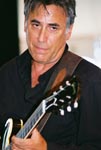 Danny
Kortchmar met James Taylor in the early '60's on
Martha's Vineyard and the two began to play folk gigs
locally. Kootch (as he is sometimes called) was a member
of a number of aspiring New York '60s groups; the Kingbees
(which backed up a Peter* & Gordon tour) and Flying
Machine** (which featured James Taylor). [Peter* Asher
(later A&R at Apple Records) released the Flying Machine's**
demos in 1971 under the title "James Taylor &
The Original Flying Machine."] With the Flying Machine
"in pieces on the ground," Danny spent six
months with the Fugs in the late '67 and moved to
LA with exFug Charles Larkey. They met Carole King and
formed The City. The band never toured due to King's stage
fright. Danny
Kortchmar met James Taylor in the early '60's on
Martha's Vineyard and the two began to play folk gigs
locally. Kootch (as he is sometimes called) was a member
of a number of aspiring New York '60s groups; the Kingbees
(which backed up a Peter* & Gordon tour) and Flying
Machine** (which featured James Taylor). [Peter* Asher
(later A&R at Apple Records) released the Flying Machine's**
demos in 1971 under the title "James Taylor &
The Original Flying Machine."] With the Flying Machine
"in pieces on the ground," Danny spent six
months with the Fugs in the late '67 and moved to
LA with exFug Charles Larkey. They met Carole King and
formed The City. The band never toured due to King's stage
fright.
Besides solo and group album releases, Kortchmar
did session work in LA, playing on most of King's
and Taylor's records. He toured with both and became
one of LA's better known session players, playing
on many major '70's albums, including those
of Crosby & Nash, Jackson Browne, and Linda Ronstadt.
In 1979 he moved to producing beginning with
Louise Goffin, Carole King's daughter. In 1981 he
joined Don Henley's band. He was the cowriter and
coproducer of most of Don Henley's solo projects.
With his friend Jackson Browne, he cowrote songs, notably
"Somebody's Baby," "Shaky Town,"
and "Tender Is The Night."
Kortchmar has worked with the likes of Bon Jovi,
Bob Dylan, Billy Joel, Neil Young, Carly Simon, and the
Spin Doctors. He's also squeezed in another band,
Slo Leak. He's now working with Boz Scaggs and with
Hanson on their forthcoming record, "Underneath."

|
THE FILMS
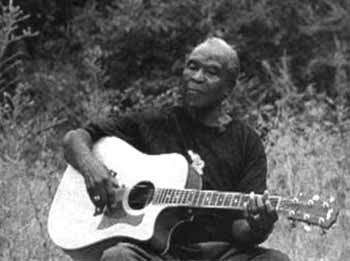 HONEYBOY HONEYBOY
A lively biography of 88 year old Delta Blues
singer and 2002 NEA National Heritage Fellowship recipient
David "Honeyboy" Edwards, this film delivers the
Blues, its roots, personal accounts of the Deep South before
the civil rights movement, heartfelt stories of Edwards'
missed recording opportunities and life on the road.
2002, 82 min., Chicago, IL. Director: Scott Taradash,
Producer: Jamie Tarandash, Featuring: David "Honeyboy"
Edwards, BB King, Sam Carr, Willie Foster, Bruce Iglauer,
RB Moore, Waymon Meeks, Ace Atkins, Michael Frank.
THE BLUESTM
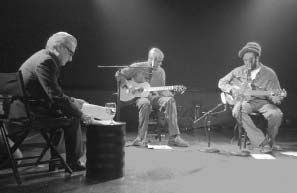 A
30 minute compilation reel of The BluesTM,
executive produced by Martin Scorses and premiering Sunday,
September 28 at 9 p.m. on PBS, anchors a mult-media project
to help raise awareness of the blues and its contribution
to American culture
and music worldwide. Volkswagen is the exclusive sponsor
of The BluesTM project. The
BluesTM is a presentation of Vulcan
Productions and Road Movies in association with Cappa
Productions and Jigsaw Productions; WGBH Boston presents
the series on PBS; public television funding is provided
by PBS and the Corporation for Public Broadcasting. Along
with Scorsese, Paul G. Allen and Jody Patton of Vulcan
Productions and Ulrich Felsberg of Road Movies are executive
producing the series; Alex Gibney is the series producer;
Margaret Bodde is the producer, and Richard Hutton is
the co-producer. A
30 minute compilation reel of The BluesTM,
executive produced by Martin Scorses and premiering Sunday,
September 28 at 9 p.m. on PBS, anchors a mult-media project
to help raise awareness of the blues and its contribution
to American culture
and music worldwide. Volkswagen is the exclusive sponsor
of The BluesTM project. The
BluesTM is a presentation of Vulcan
Productions and Road Movies in association with Cappa
Productions and Jigsaw Productions; WGBH Boston presents
the series on PBS; public television funding is provided
by PBS and the Corporation for Public Broadcasting. Along
with Scorsese, Paul G. Allen and Jody Patton of Vulcan
Productions and Ulrich Felsberg of Road Movies are executive
producing the series; Alex Gibney is the series producer;
Margaret Bodde is the producer, and Richard Hutton is
the co-producer.

|
EVENT PHOTOS by BARRY M. MILLER
copyright 2003 The Reel Blues Fest, Inc.
all rights reserved
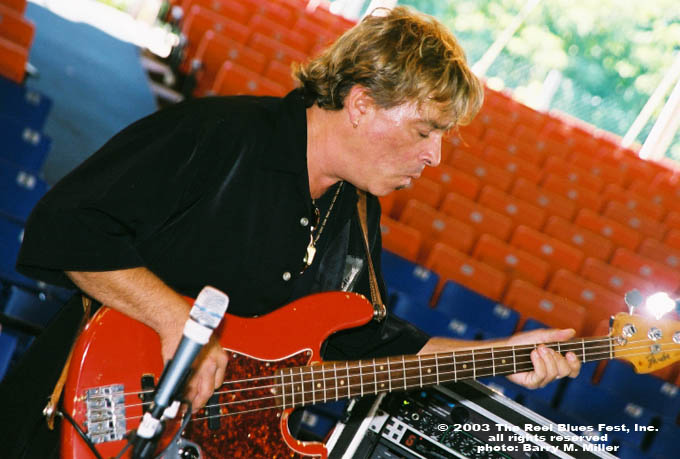
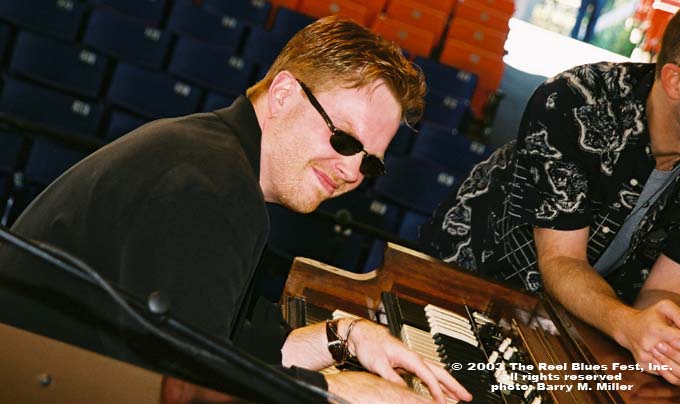
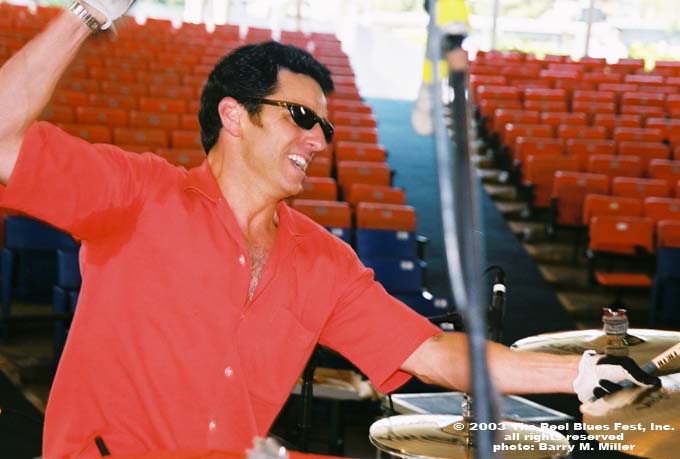
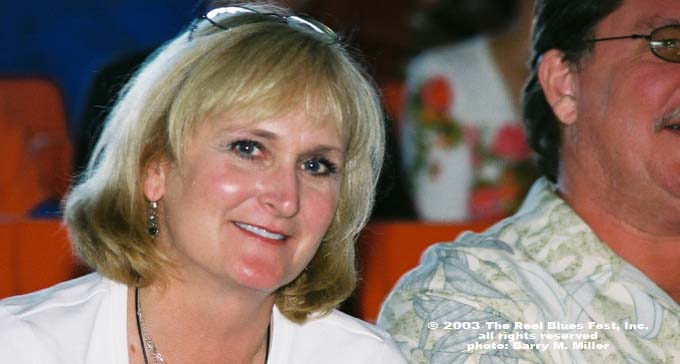
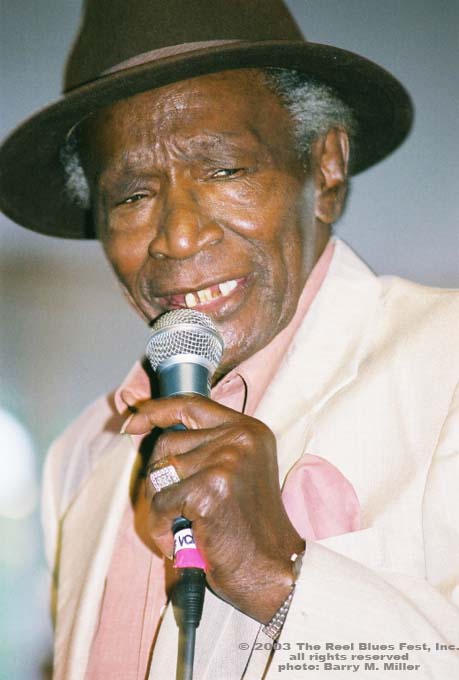
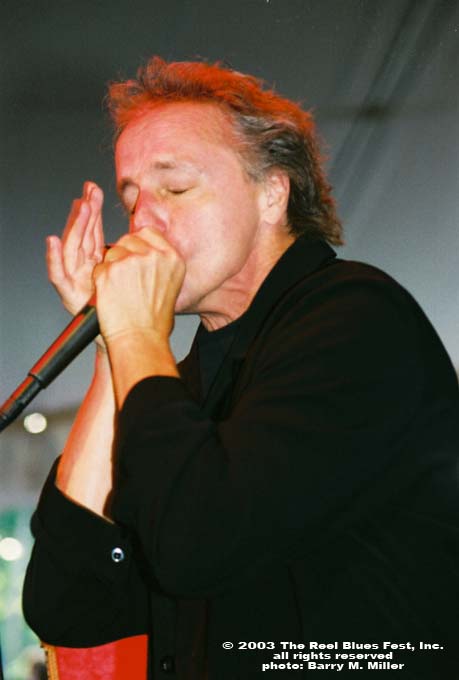
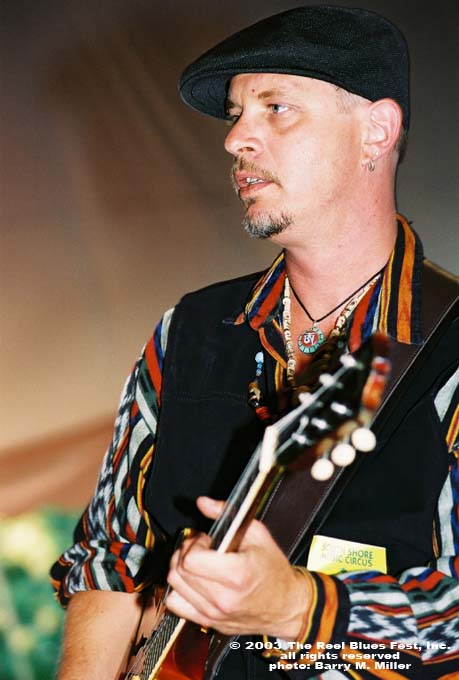
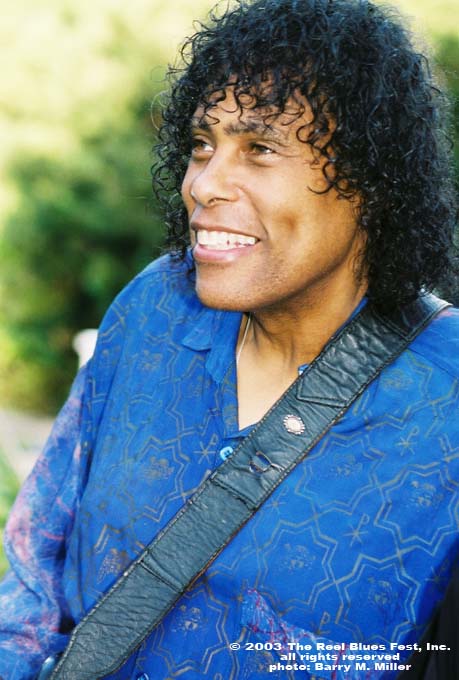
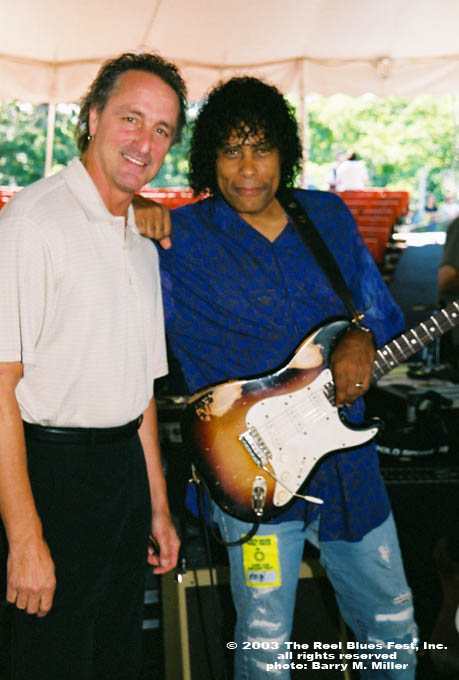
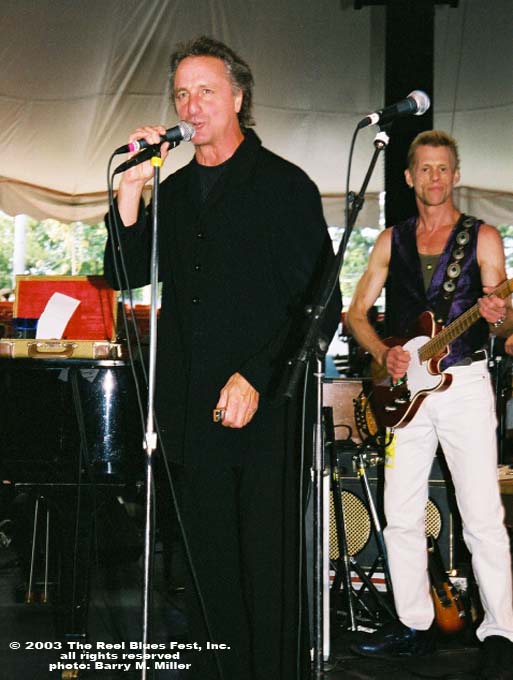
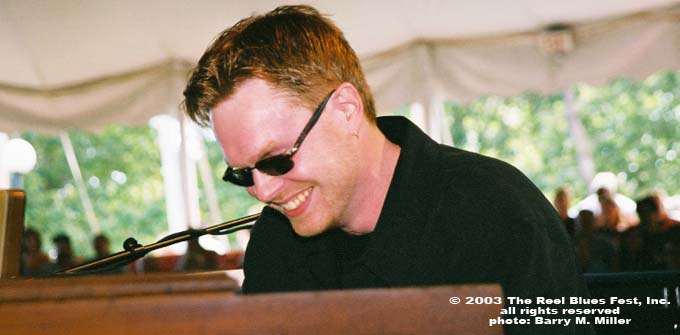
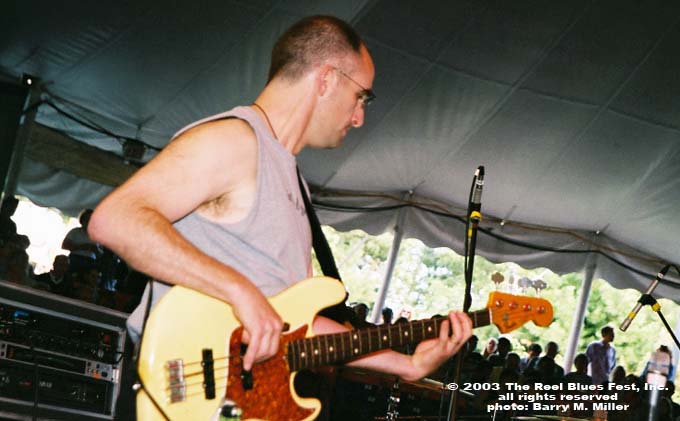
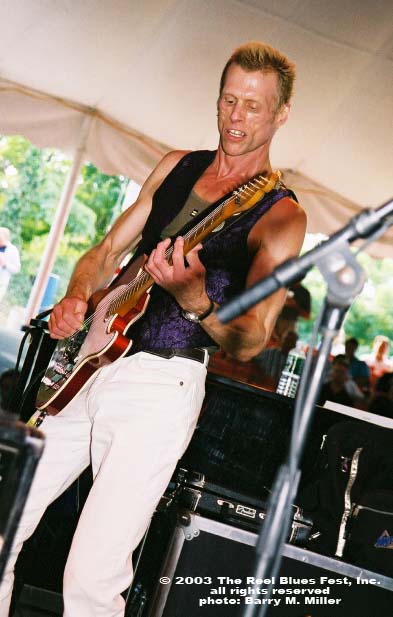
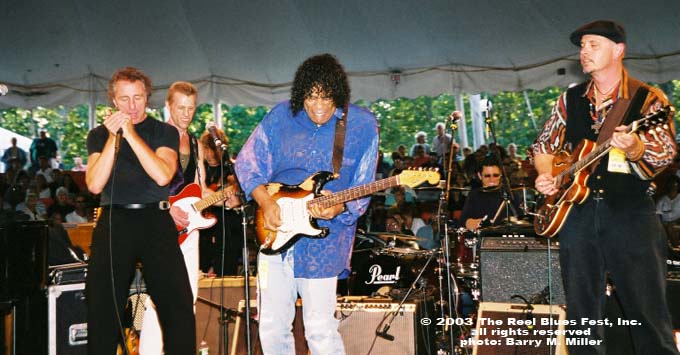
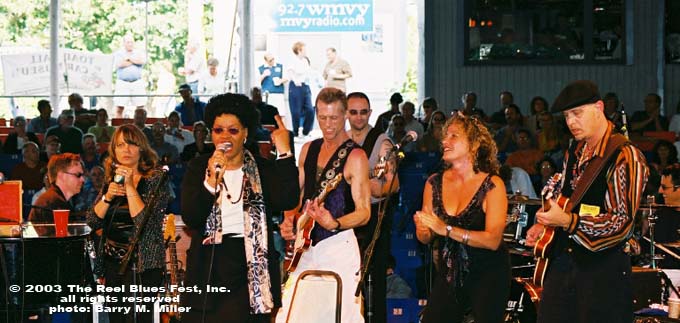
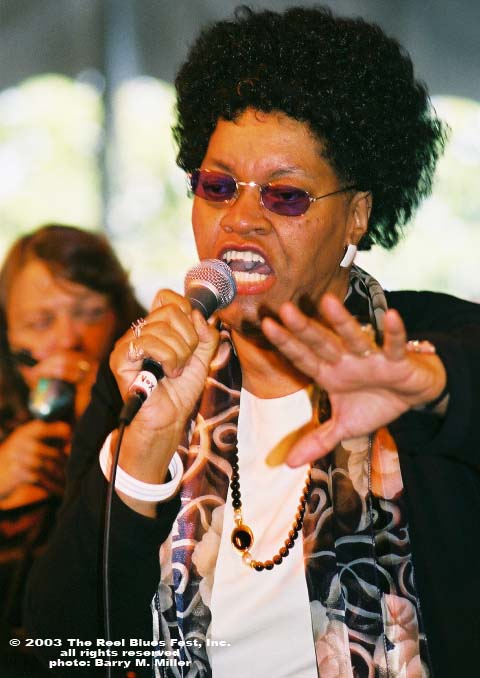
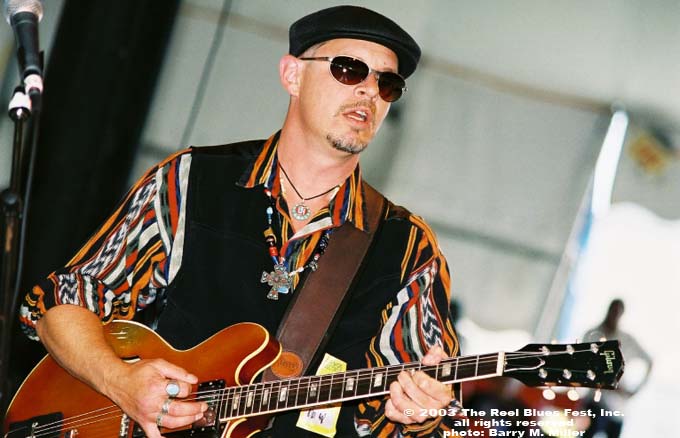
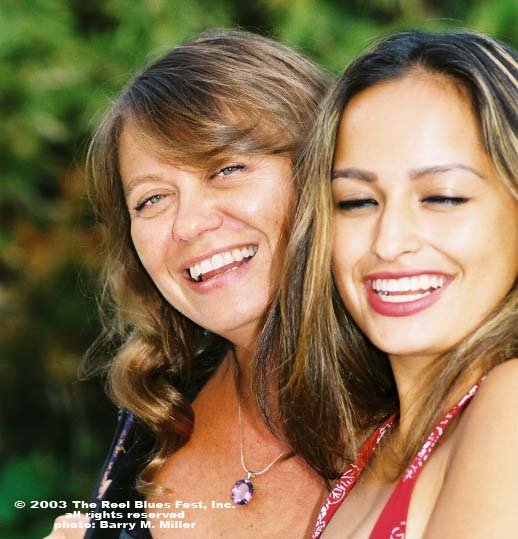
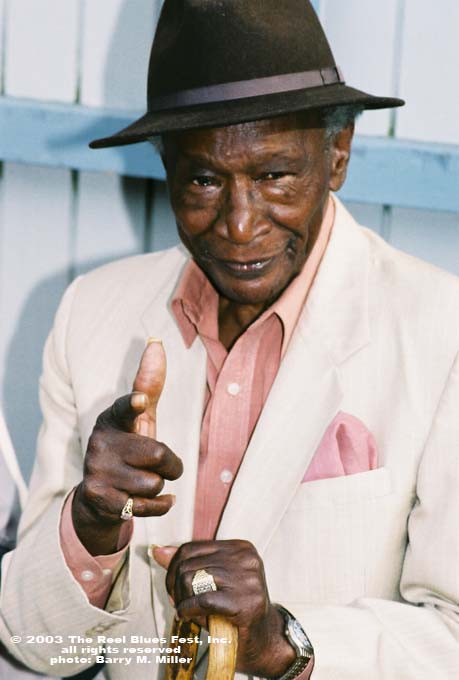
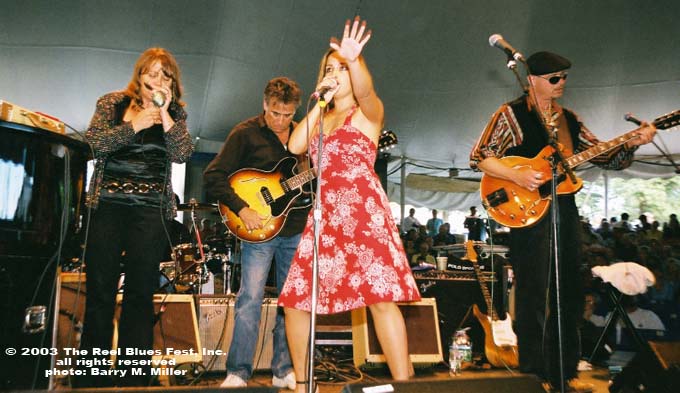
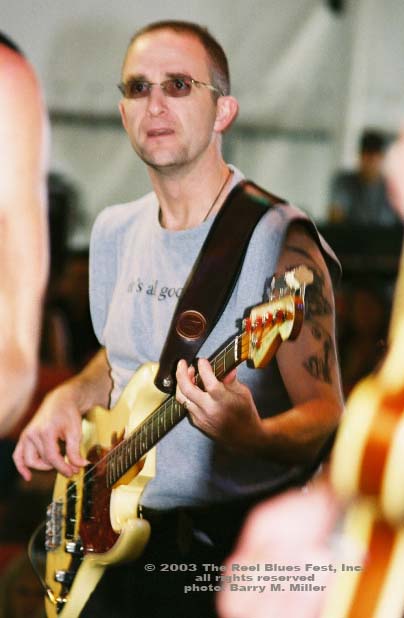
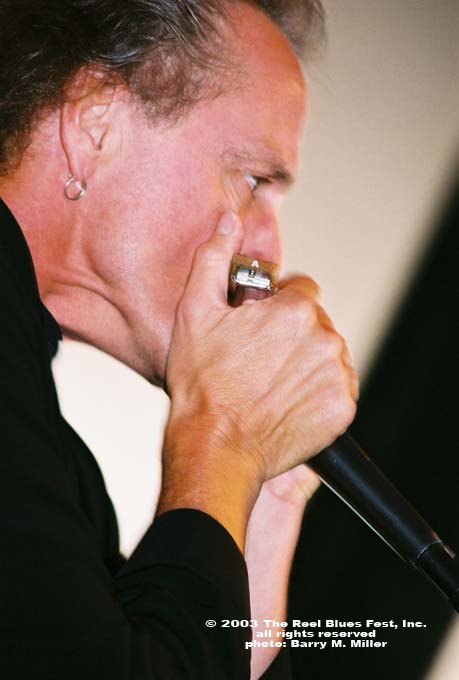
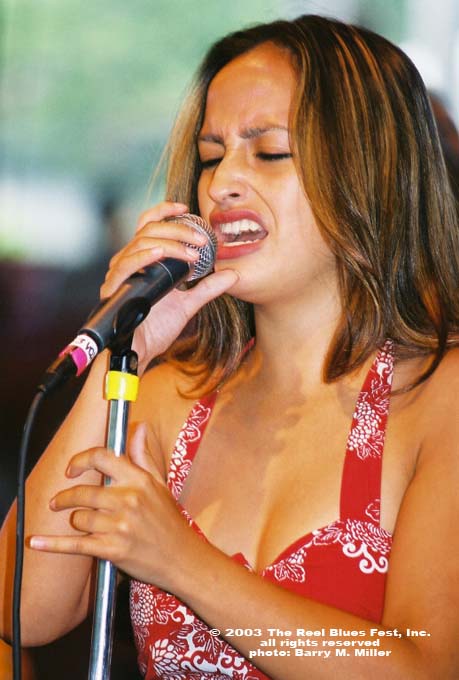
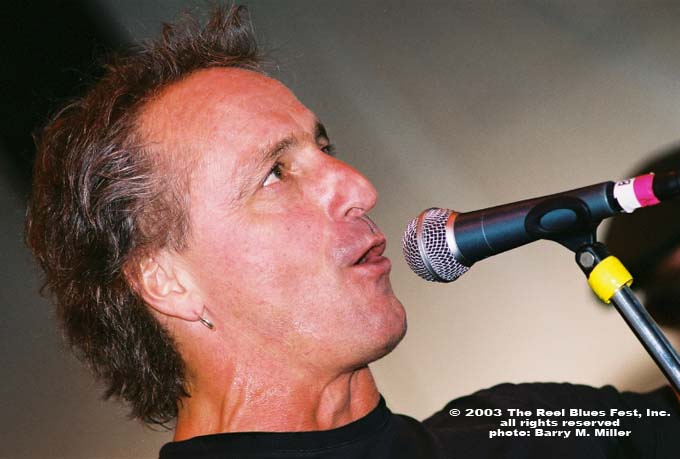
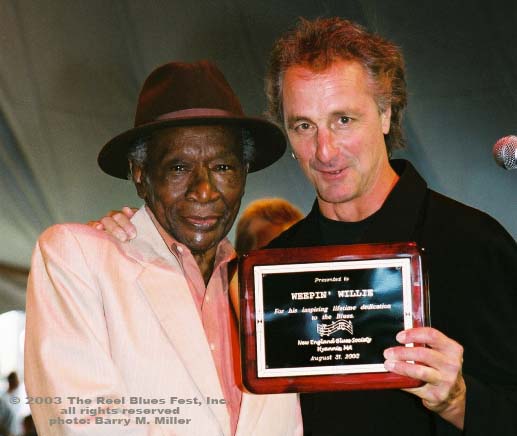
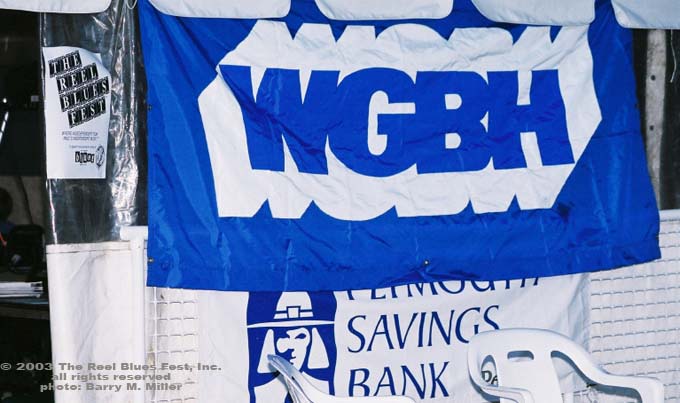
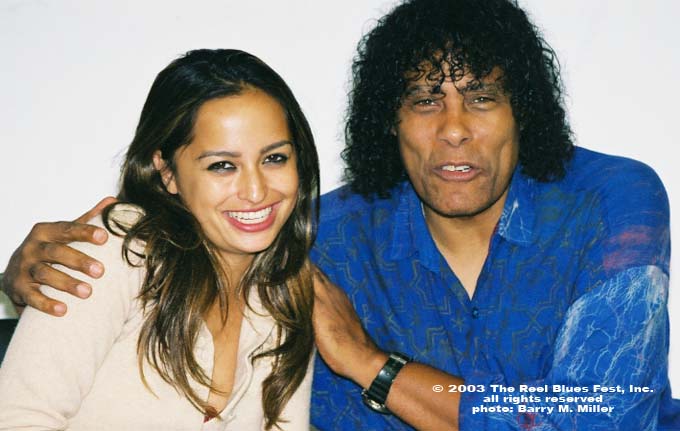
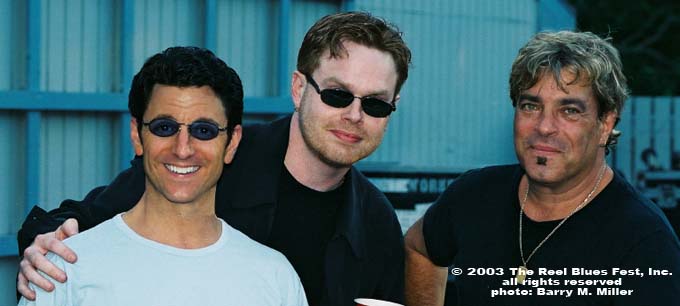
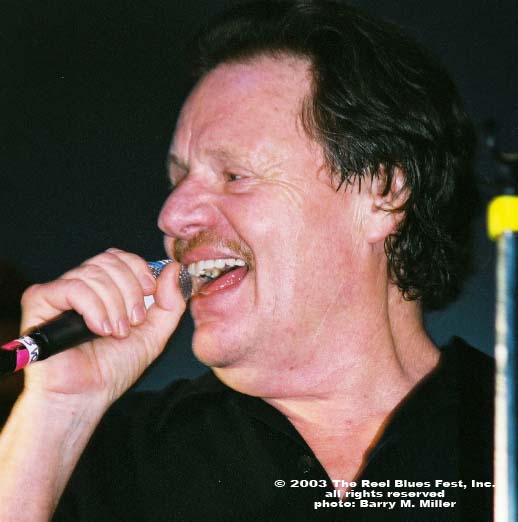
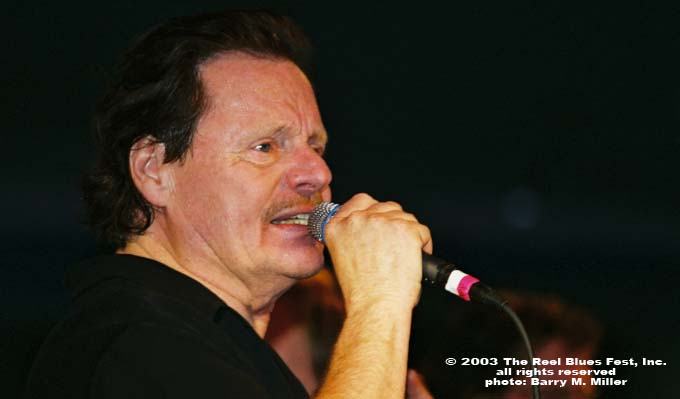
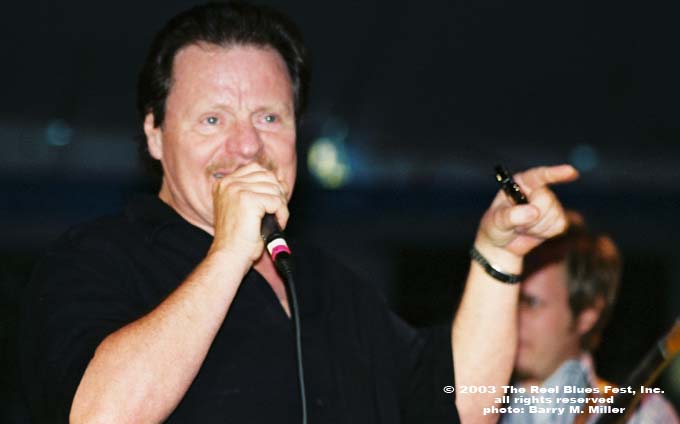
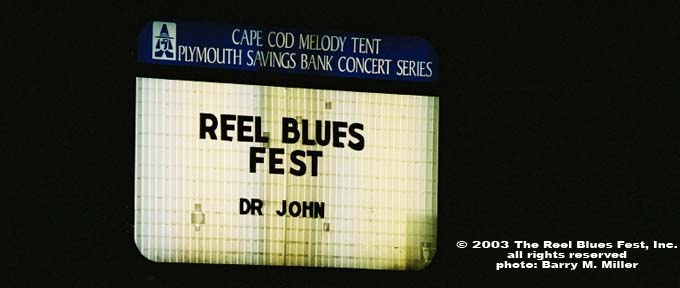
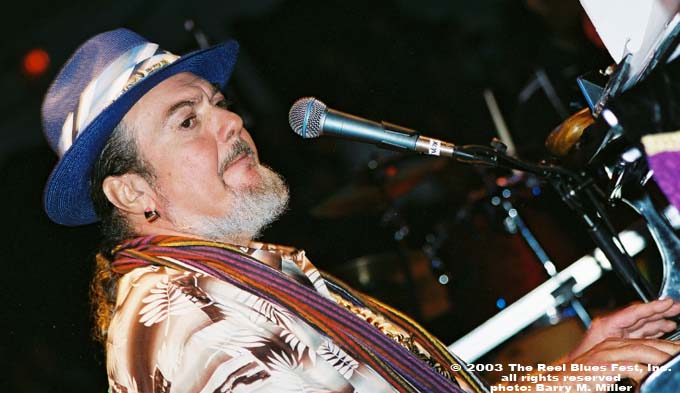
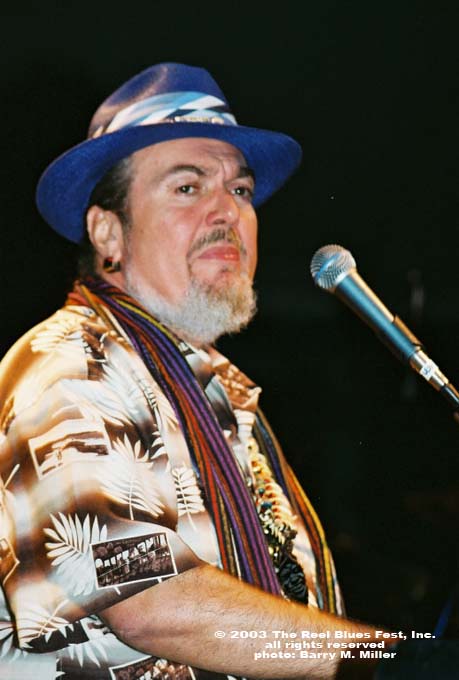
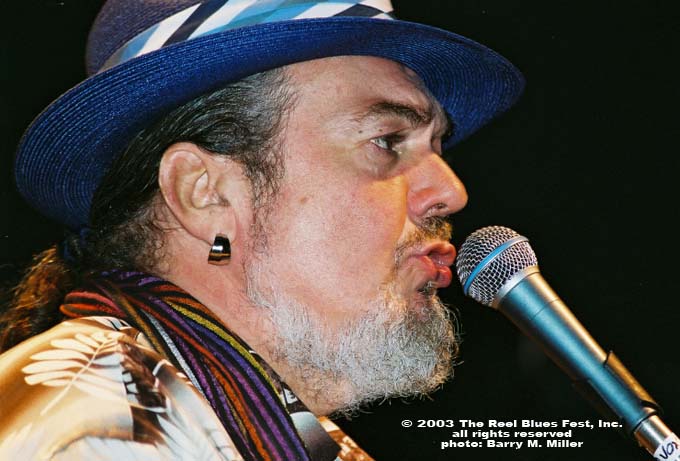
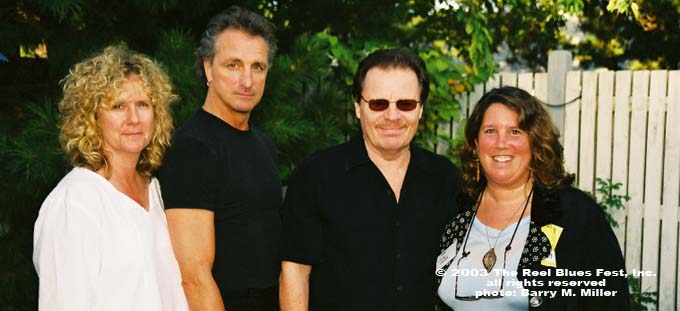
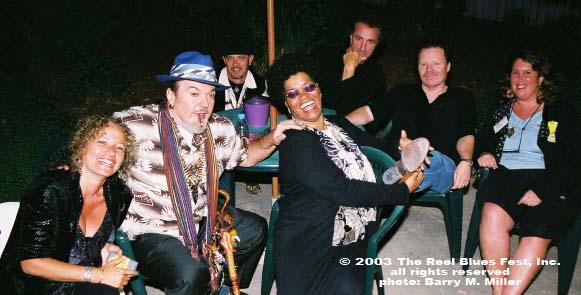
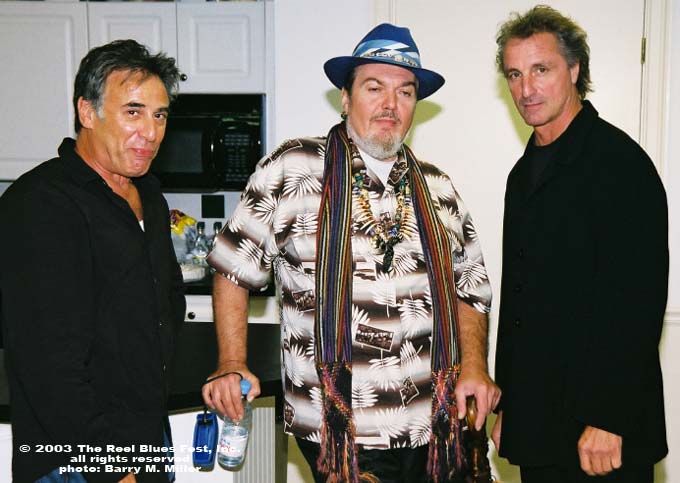
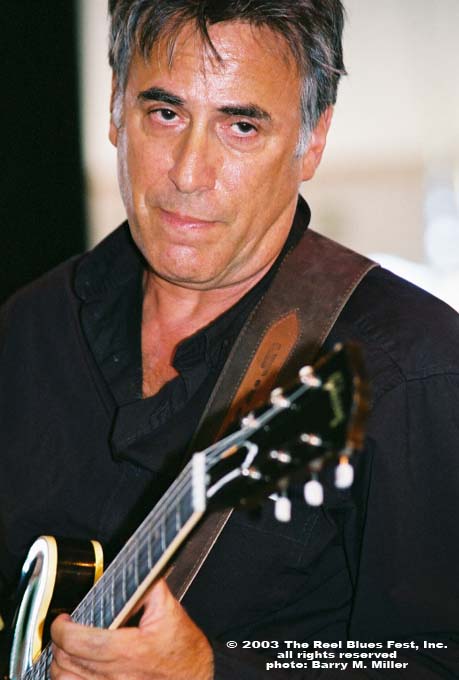
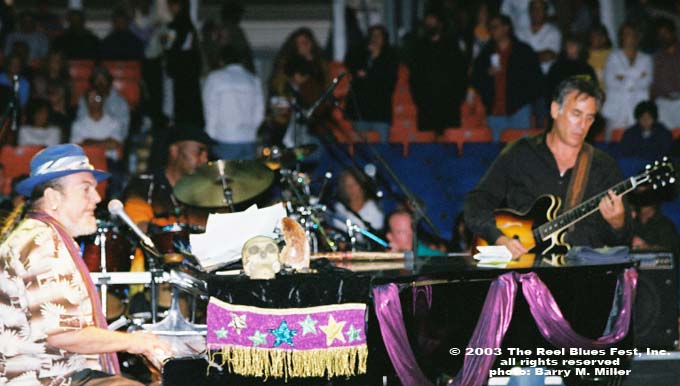
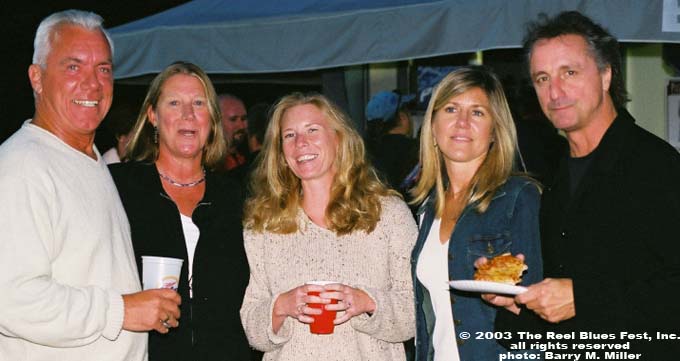

|
EXTRAS
POSTER
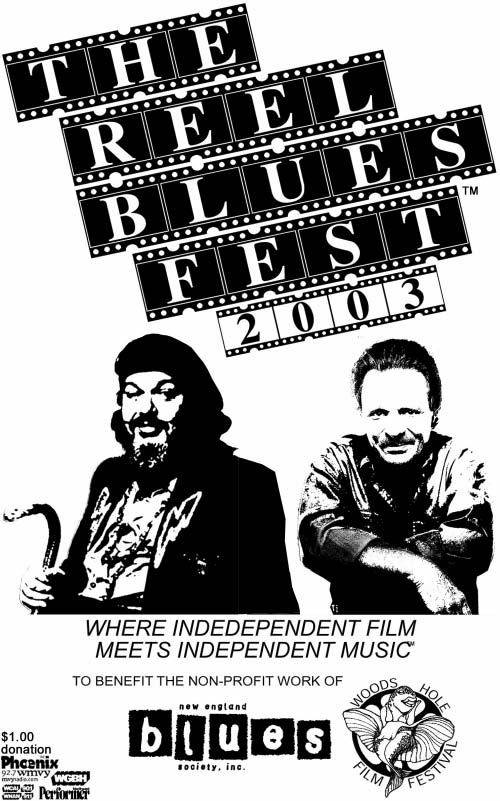
SPONSORS AND ADVERTISERS FOR THE FEST
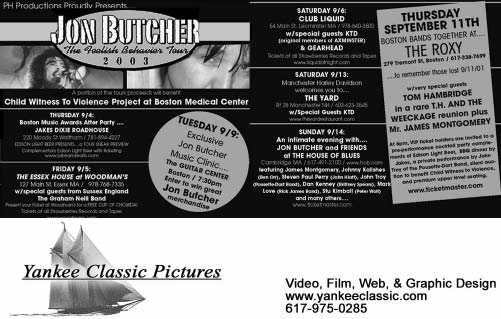

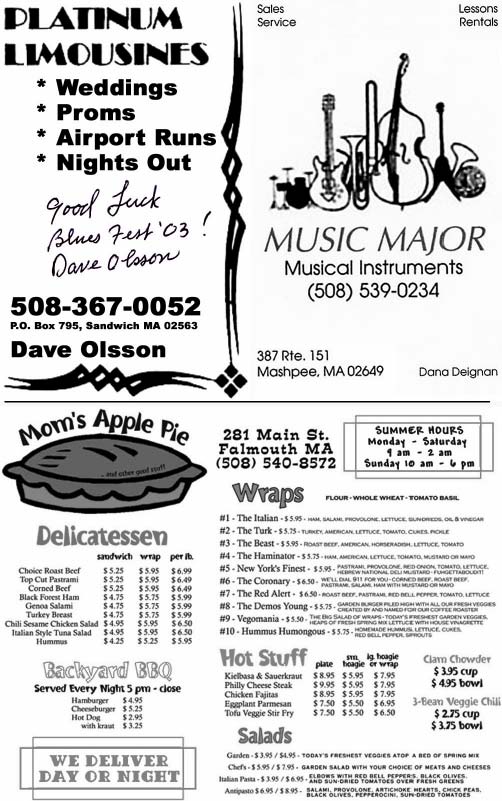
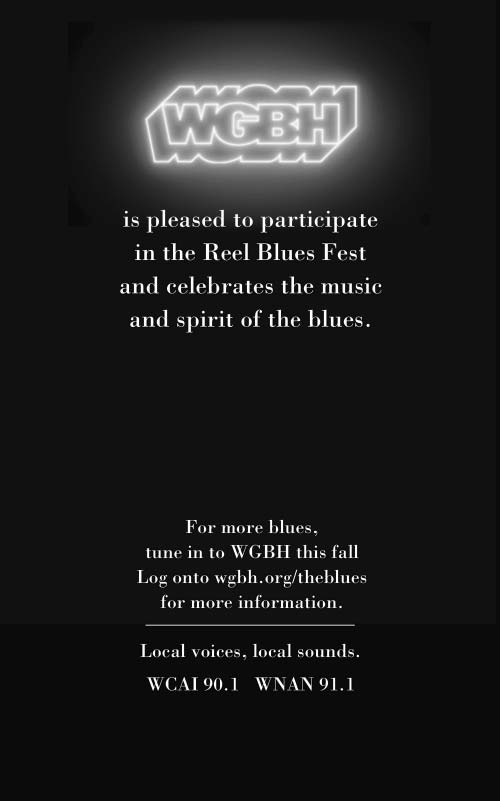

|
| |
The
Reel Blues Fest, Inc. is a non-profit organization dedicated
to helping musicians receive access to medical care and to
supporting the work of independent filmmakers. Proceeds from
events will be distributed to eligible 501 (C) (3) organizations
pursuant to the guidelines established by The Reel Blues Fest,
Inc.
| For
more information call 508-495-FILM |
|
|